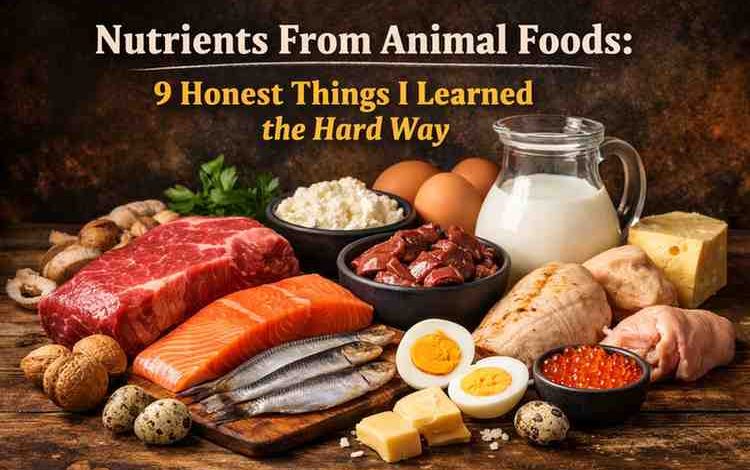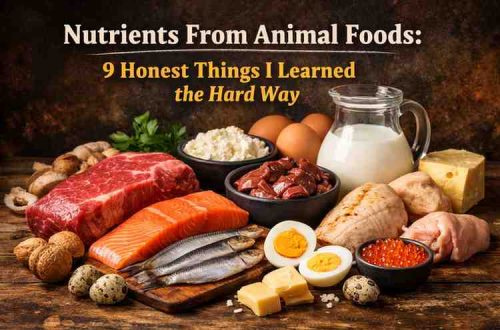

I’m not gonna lie… I didn’t grow up thinking about nutrients from animal foods.
I just ate whatever showed up on my plate — chicken, eggs, fish, the occasional burger that tasted better at midnight than it should’ve.
But the older I got, the more my body started acting like an overworked phone battery.
Low energy.
Random headaches.
Skin doing its own unpredictable dance.
And this weird “tired-but-wired” thing that I blamed on everything except my actual diet.
Then one morning, while staring at a plate of scrambled eggs and wondering why I felt so sluggish all the time, a friend told me something that hit harder than I expected: “Your body might just need different nutrients. Have you even checked what you’re missing?”
I hadn’t.
Not even once.
But that’s what kicked off this whole journey into understanding nutrients from animal foods — what they give, what they don’t, what I messed up at first, and what actually helped me feel normal again.
So yeah, this isn’t some perfect guide.
More like a 1 a.m. text thread from someone who tried things, failed things, and finally pieced together a gut-level understanding of how animal-based nutrients actually work.
1. Why I Even Looked Into Nutrients From Animal Foods (The Crash Point)
Honestly?
I didn’t go searching out of curiosity. I went searching out of frustration.
I kept feeling:
-
tired after meals
-
hungry at weird times
-
mentally foggy
-
cold all the time
-
sore for no reason
I assumed it was stress or lack of sleep or “maybe I’m just getting old.”
But after a friend mentioned it might be nutrient-related, I actually looked at my meals.
And… wow.
There were weeks where the only animal foods I ate were:
-
one egg
-
a bite of cheese
-
some chicken from a sandwich I barely noticed
No wonder my energy was trash.
So I started paying attention to what nutrients from animal foods actually do — like, what they really do, not the over-sanitized textbook version.
What I found honestly surprised me.
2. The Nutrients I Didn’t Realize Were Mostly Found in Animal Foods
This was the “oh damn…” moment for me.
Because a lot of the stuff our bodies desperately need?
Yeah — they show up big-time in animal foods.
Here are the ones that hit me the hardest once I understood them:
1. Vitamin B12
If energy had a best friend, it would be B12.
Animal foods carry it.
Plants don’t.
Period.
When I finally started getting enough B12?
My brain stopped feeling like it was buffering.
2. Heme Iron
I used to think “iron is iron.”
Nope.
Heme iron (from meat) absorbs so much better.
When I wasn’t getting enough, I felt:
-
lightheaded
-
moody
-
weirdly exhausted
Adding a little red meat made a huge difference — way more than spinach ever did.
3. Omega-3s (EPA & DHA)
Veg sources only have ALA, which the body barely converts.
Fish gives the EPA/DHA directly.
My sleep and mood improved in a way I didn’t expect.
4. Vitamin D3
There’s D2 (plants).
Then there’s D3 (animal foods, especially fish and egg yolks).
D3 just works better.
My winter mood swings chilled out after adding it.
5. Zinc
If you’re always getting sick or healing slow?
Yeah… zinc.
Red meat is king here.
6. Creatine
No supplement ever made me feel as strong or as clear-headed as just eating more meat a couple times a week.
I didn’t expect that at all.
7. Complete Protein
Animal foods give every amino acid without needing food math.
This one honestly surprised me the most.
8. Choline
Eggs saved me on this.
Choline = brain fuel.
Turns out I was missing a lot of it.
9. Selenium
Just one Brazil nut has a ton, but seafood has the kind that absorbs better.
Helped a lot with fatigue.
And here’s the thing I didn’t expect:
You don’t need big servings.
You need consistent servings.
That was a game-changer.
3. My Dumb Mistakes When Trying to “Eat Healthier”
Here’s where I embarrassed myself.
When I tried to “clean up” my diet, I accidentally made things worse because I cut out so many nutrients from animal foods without replacing them.
My mistakes:
Mistake #1: Replacing meals with salads
My stomach was full.
My body was starving.
Mistake #2: Eating only egg whites
The yolk is where the nutrients are.
What was I thinking?
Mistake #3: Switching to plant-based everything
Plant-based is fine — but I didn’t know how to balance it.
I just cut things without adding alternatives.
Mistake #4: Avoiding red meat completely
I thought it was “healthier.”
Turns out I just needed it once a week for iron and zinc.
Mistake #5: Eating too little fat
Animal fats carry fat-soluble vitamins.
My skin and hair got dull fast.
Not proud of this journey.
But hey — at least I learned.
4. What Actually Helped (After Way Too Much Trial-and-Error)
I stopped complicating things.
Stopped punishing myself.
Stopped treating food like a moral choice.
Once I did that?
It became simple.
Here’s what worked:
1. Adding one solid animal food per meal
Not giant portions.
Just some:
-
an egg
-
a piece of fish
-
a little chicken
-
yogurt
-
cheese
-
beef once in a while
Instant energy difference.
2. Eating fish twice a week
Omega-3s changed my brain in ways I can’t explain without sounding dramatic.
3. Keeping eggs as a daily anchor
The yolk alone has:
-
choline
-
B12
-
vitamin D
-
healthy fats
-
iron
-
protein
Eggs basically became my nutrient insurance.
4. Switching to real cheese instead of “diet cheese”
My digestion actually improved.
5. Choosing quality over quantity
I didn’t need more meat.
I needed better meat.
6. Adding bone broth on stressful days
It sounds like a grandma remedy.
But man… it calmed my stomach like nothing else.
7. Eating slowly
This one shocked me.
Chewing actually changes how you absorb nutrients.
Who knew?
5. The Differences I Noticed (This Part Still Feels Wild to Me)
I’m not saying nutrients from animal foods fixed everything.
But the changes were real — and honestly unexpected.
After 4–6 weeks:
Energy
No more afternoon crash.
Skin
More glow, fewer breakouts.
Hair
Less shedding.
Shinier.
Softer.
Strength
Workouts felt easier.
Recovery was so much faster.
Mood
Way fewer “I hate everything” days.
Hunger
More stable.
No more random cravings.
Sleep
Deeper and more satisfying.
Digestion
My gut felt… calmer.
Which is rare for me.
I didn’t expect nutrients from animal foods to change so many things at once, but they did.
6. The Minimalist Guide (If You Don’t Want to Overthink This)
If someone asked me for the simplest possible routine, I’d say:
-
1 egg per day
-
Fish twice a week
-
Chicken or beef 3–4 times a week
-
Greek yogurt every other day
-
Cheese in moderation
-
Bone broth when stressed
Seriously — that alone covers almost everything.
No fancy cooking.
No complicated nutrient charts.
Just real food.
7. But What If You Don’t Want Too Much Meat?
Totally fair.
Here’s what actually covers nutrients from animal foods with minimal servings:
-
lobster
-
sardines
-
eggs
-
Greek yogurt
-
liver (occasional)
-
salmon
-
mussels
These foods are crazy nutrient-dense.
Small portions = big impact.
I wish someone told me this earlier.
8. The Honest Truth (Because Diet Culture Is Annoying)
Here’s the real deal:
-
animal foods aren’t magic
-
plant foods aren’t magic
-
balance is magic
Some nutrients just come easier from animals.
That’s it.
No moral drama.
And when I finally accepted that?
My body chilled out.
My mind chilled out.
Everything felt less… complicated.
The Real Takeaways (If You Skipped Everything)
Here’s the fast version — the stuff I wish I’d known before spiraling:
1. Nutrients from animal foods hit different
They absorb better.
They work faster.
They fill gaps you didn’t even know you had.
2. You don’t need huge portions
Small but consistent is enough.
3. Eggs are basically cheat codes
I’m still shocked.
4. Fish is medicine for the brain
Two servings a week. Game changer.
5. Red meat isn’t the enemy
Just don’t overdo it.
6. Don’t copy influencer diets
Your body is not their body.
7. You’re not “unhealthy” for eating animal foods
You’re just giving your body what it needs.
I don’t have a perfect ending for this.
But I will say this:
If you’re confused or overwhelmed or tired of trying to figure out what your body wants, you’re not alone.
I spent way too long ignoring the simple truth: nutrients matter.
And nutrients from animal foods?
They’re some of the most powerful, straightforward, body-friendly ones you can get.
Not magic.
Not a miracle.
But absolutely worth understanding.



